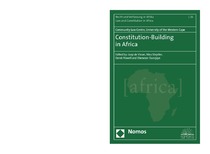Constitution-Building in Africa
Date
2015Author
de Visser, Jaap
Steytler, Nico
Powell, Derek
Durojaye, Ebenezer
Metadata
Show full item recordAbstract
The process towards the adoption of a constitution is determined by the
context in which the constitution is written. It navigates such issues as political
engagement, keeping politically agreed timelines, ensuring the inclusion
of a variety of constituencies and groups, the use of domestic and
foreign technical expertise, and ensuring legitimacy and public awareness.
This book examines examples of constitution-making processes around
the continent and how they attempt(ed) to accommodate the many interests
at play.
As such, the chapters offer a range of different constitution-making narratives.
In Zimbabwe, the Global Political Agreement (GPA) provided for
a parliamentary select committee, co-chaired by the three main political
parties, to lead the drafting of a constitutional text. The process included
public hearings and a referendum. In the case of Malawi, all of its five
constitutional review projects were initiated by the presidential appointment
of a constitutional review commission or technical drafting committee.
The drafting of the country’s 1966 Constitution took place primarily
under the auspices of the ruling Malawi Congress Party; the 1995 constitutional
review process was led by a National Consultative Council and consisted
of various consultative processes. While this review was markedly
more inclusive, it still lacked legitimacy. The making of Kenya’s 2010
Constitution was, by all accounts, impressive in its inclusivity. With the
horrors of the 2007/2008 post-election violence engraved in collective memory,
and the experience of the impressive consultation, led by the Ghai
Commission, still fresh in mind, Kenya’s Constitution was drafted on the
basis of extensive consultation.

